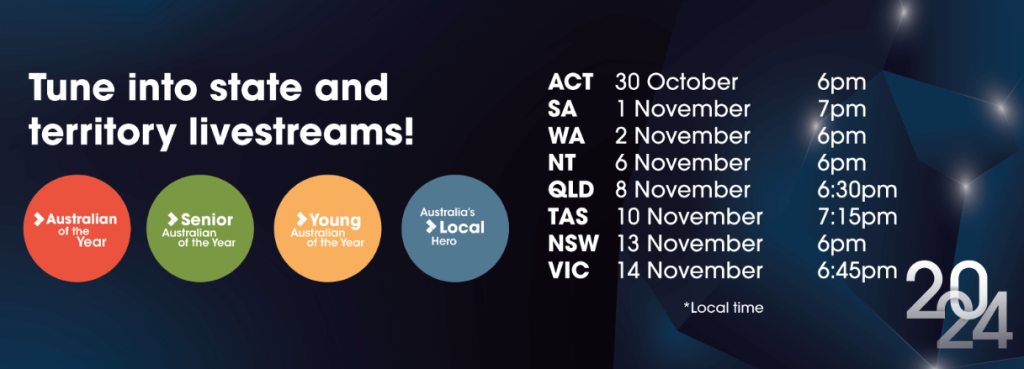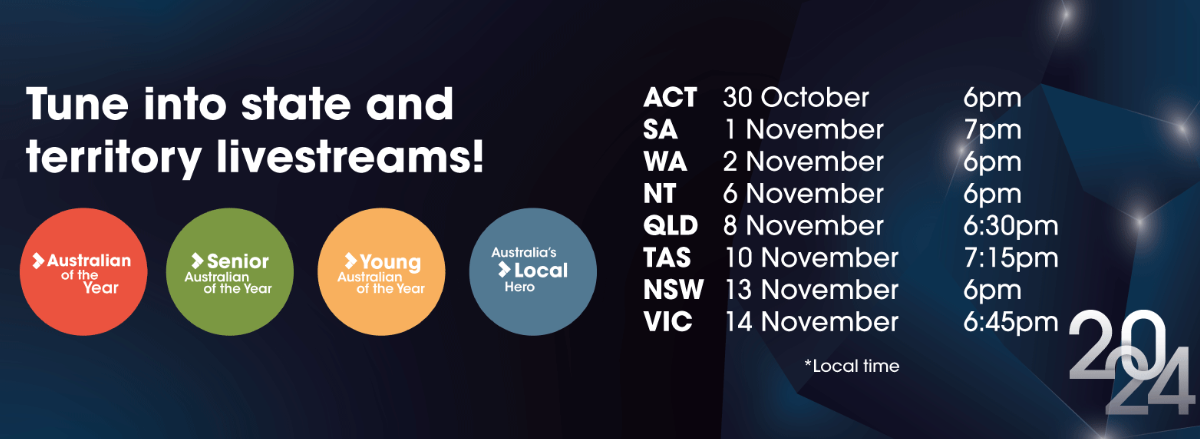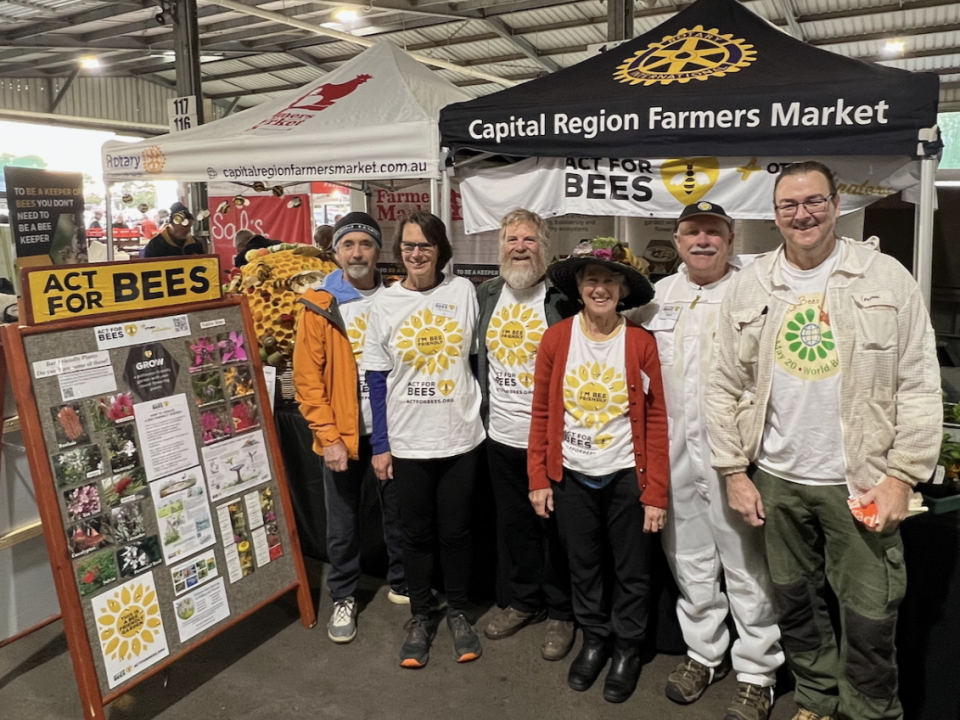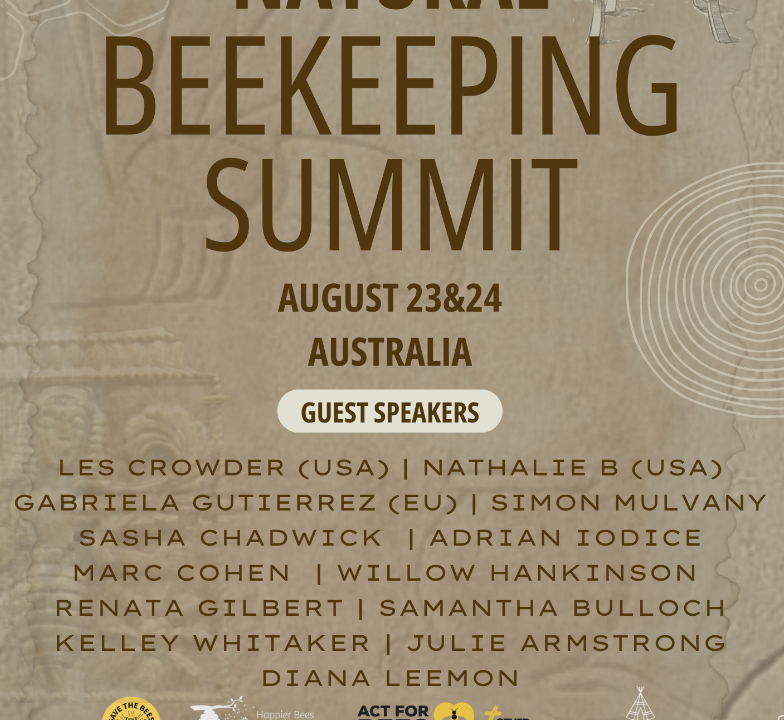
Spring into nature connection
August 29, 2023
An honour to be nominated for ACT Local Hero Australian of the Year 2024
November 1, 2023I wanted to share the exciting news that we (ACT for Bees) have been nominated for ‘Local Hero’ ACT Australia Day awards and we are in the final next Monday 30th October at 6pm. Go to australianoftheyear.org.au to watch the live stream on Monday 30 October at 6:00pm(AEDT). #WereAllPartOfTheStory
It is such an honour and I want to thank those who have nominated me as the representative of our group as ‘a voice for the bees and pollinators’. It is an exciting platform to show that bees are ‘more than stings and honey’, that they are vital for food security, biodiversity and healthy ecosystems. With Australian Pollinator week very near, it’s an amazing opportunity to shine a light on the range of native bees that are particularly vulnerable to pesticides, habitat disturbance and lack of flowers!
We will see how this higher public profile impacts our key message on the importance of pollinators and how we can all support their health and wellbeing by planting for year round flowering in our gardens, our streetscapes, our schools and open spaces. This also has a positive impact on our health and wellbeing as a growing body of research is showing.

Which brings me to a call out for volunteers to help out with this Pollinator Citizen Science project.
This October 2023, citizen science surveys of insect pollinators will commence as part of the Canberra Urban Biodiversity Surveys (CUBS), an exciting new initiative from the ACT Government. Ecologists in the Office of Nature Conservation are calling upon enthusiastic volunteers to conduct simple 30-minute visual surveys of insect pollinators interacting with floral resources at designated monitoring sites. All you need is a camera to capture photos of these pollinators and a computer to upload the photos as a survey to Canberra Nature Map. Be sure to stay tuned to the Canberra Nature Map home page for upcoming details and an official call for volunteers. Your participation will not only contribute to important research on urban biodiversity but also enrich your connection with the fascinating world of insect pollinators!
EVENTS
November 11th-18th is Australian Pollinator Week!

Australian Pollinator Week
November 11th-19th
Australian Pollinator Week acknowledges our important and unique insect pollinators during our southern spring (November). It is a designated week when communities, businesses and organisations can come together to raise awareness of the importance of pollinators and support their needs.
Through group activities, community members can learn and laugh together as they help to support our pollinators. By engaging communities in schools, retirement villages, art groups, gardening clubs, community gardens, local council areas, Landcare groups and neighbourhoods we can increase awareness and act on our increased knowledge.
Building Bee Hotels with ACT for Bees
November 11th 1:00 – 3:00 pm
This workshop will focus on the importance of our native bees and pollinators and show you the ideal way to host them in your yard, from what to plant to attract them to how to provide them with their perfect habitat.
Learn how to build and take home your own bee hotel, along with learning all about the different types of native bees who will visit you.
With assistance from the ACT Government under the ACT Community Zero Emissions Grants Program.
Landcare Festival of Nature
With a range of different events including guided wildflower and bird walks, froggy fun nights, photography and nature journaling workshops, there’s something for everyone. Designed as an umbrella events festival (similar to the Heritage Festival), the Festival of Nature allows for a range of Landcare and other volunteer groups and environmental organisations to offer a calendar of diverse events, centrally supported and promoted by Landcare ACT. The festival will run throughout the Spring of 2023.
Fun with bees at the launch of the Festival of Nature and Floriade

Verge Planting at Whitlam
We were very pleased to see the ‘Demonstration verge planting for pollinators’ at Whitlam by the ACT Government Suburban Land Agency during the ‘Care, Share, Repair’ event 6th October. Their updated Climate Wise Garden Designs booklet has the Bee to Zee guide to plants information about ‘edible’, ‘bird attracting’, ‘butterflies’, ‘encouraging bees’ and ‘lizards love it’ information. Worth downloading a copy to plant out your verge.
This followed on from the launch of Festival of Nature where we were busy making native bees. Whitlam is beginning to buzz!
We had a great launch in Whitlam with lots of beautiful native bees made from natural materials.
We also made native bees at a workshop at Floriade, thanks to the Canberra Environment Centre.
‘Be a bee and pollinate the apple tree’ is a very popular activity, where the children experience what pollination is ‘from a bees perspective’. Brush the pollen onto the flower, and after many visits, an apple begins to grow. This is the ‘lunchbox’ holding vital nutrition for the seeds for future apple trees. The bees are rewarded for their work with a tasty piece of apple. This is what pollination is about. In Australia 65% of European introduced horticultural and agricultural crops are entirely dependent on pollination by European honeybees: apples, almonds, avocado, blueberries, cucumbers, pumpkin, rockmelon, broccoli, cabbage, carrots, canola, celery and onions.
A fantastic Christmas gift that supports an important project
Australian Native Bee Calendar 2024– All profits go to a collaboration between Taxonomy Australia and the Wheen Bee Foundation to discover an estimated 1,000 native bees yet to be discovered, named and documented. Great Christmas gifts! Buy here
And to finish, please join us next Monday 30th October at 6pm. Go to australianoftheyear.org.au to watch the live stream on Monday 30 October at 6:00pm(AEDT). #WereAllPartOfTheStory




